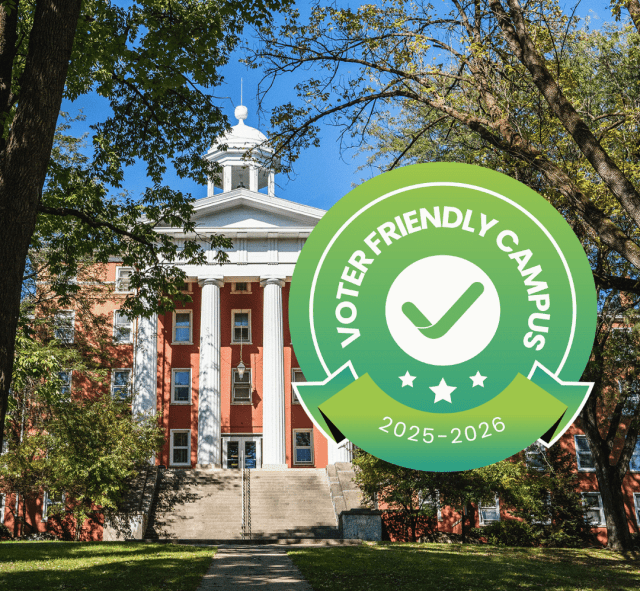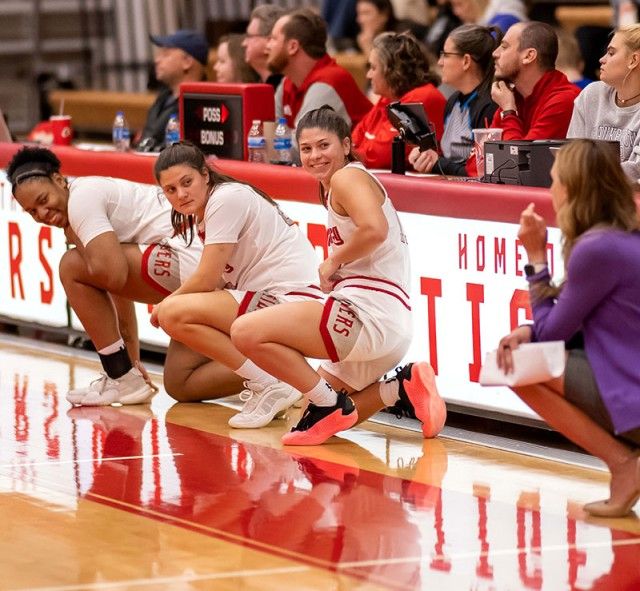Springfield, Ohio – Three advisors from Wittenberg University's Writing Center were chosen to present at the National Conference on Peer Tutoring in Writing (NCPTW) in Salt Lake City, Utah, Nov. 5-8.
Vivian Overholt and Zoey Wilson collaborated to present their research project titled “Breaking Bubbles: Building Better Bridges to the Broader Community,” and Emily Rayens teamed up with Writing Center Director Michael Mattison to present “Assumption Junction: What's a Writing Center Course's Function.” Overholt, Wittenberg class of 2017, is triple majoring in history, international studies, and Spanish, and Wilson, also class of 2017, is a psychology and photography major. Rayens, class of 2016, is a biology (pre-med) and music double major and health science minor.
“The NCPTW solicits proposals from writing center staffs from around the world and the proposals are selected through a blind-review process,” Mattison said. “That we had three students presenting is a noteworthy achievement. The work these students do is really remarkable, and they represent such a range of disciplines.”
Rayens received one of 10 travel grants from NCPTW and Overholt received a Burkean Parlor grant, one of only four given out.
“Overall, there were 20 possible grants from the organization, and Wittenberg advisors received two of them. That, according to my math, gives us 10 percent,” Mattison added. “If the writing center were a sports team, this would be roughly the equivalent of having two All-Americans on the team. The Wittenberg advisors have garnered six such awards over the last five years, in addition to making over two dozen presentations, so the three students this year continue a long tradition of representing Wittenberg at regional and national writing center conferences.”
In “Breaking Bubbles: Building Better Bridges to the Broader Community,” Overholt and Wilson explored the writing center's involvement with a middle school, a high school and a prison in a quest to understand what it means to be a center engaged in service.
“Our presentation essentially described the different ways that the Wittenberg Writing Center has been connected to writers outside of our campus this past year, concluding with how we, personally, fulfilled our community service requirement by choosing to work with writers at a local middle school,” Overholt said. “Our intent was essentially to describe the many benefits these fledgling community partnerships have brought, and to argue, using literature on the subject, that writing centers’ involvement in the communities they inhabit can bring lasting positive impacts for the center, the campus, and the community itself.”
Overholt said that there were approximately 500 participants representing more than 100 schools at the conference.
“My favorite thing about the conference was being able to see how diverse various universities and university campuses across the country are and how differently writing centers and programs function while still maintaining central pedagogies,” she said.
This year's conference had the theme "(De)Center” and was a way for students to discuss how to break assumptions on writing centers and how to advise writers.
“All advisors are required to take an extensive training course in writing center theory in order to work at the Wittenberg Writing Center and being able to expand our knowledge on basic practices and test and re-test assumptions that we have formed is extremely beneficial,” Wilson said. “We are always looking to continue our education and make our center the best it can be. This conference acts as a way for writing center workers from all over the country to share and exchange knowledge on what their centers may be doing differently; this is a great opportunity for all of us to learn and change.
“The writing center has acted as a steady force throughout my college career that has assisted my growth as a student, a writer, and as an individual,” said Wilson, who is also photo editor at The Wittenberg Torch, the university’s student newspaper. “I now truly understand how valuable writing is in the world, as it is in any career, and how I can use it to assist me in any career path I choose.”
In their presentation, Rayens and Mattison gave a voice to incoming writing center staff as they provided both video and written interviews of those most affected by writing center education: the tutors.
“The Wittenberg Writing Center was not something I ever expected to be a part of coming in to college,” Rayens said. “As a dual major in the arts and sciences, I always considered writing more of a tool than a focus. But after I applied, took the class, and began working there, I realized how well it has equipped me for the future. Not only has my writing improved overall as member of the center, I have gained the skills to collaborate with people in a positive way on a variety of topics and situations.”







